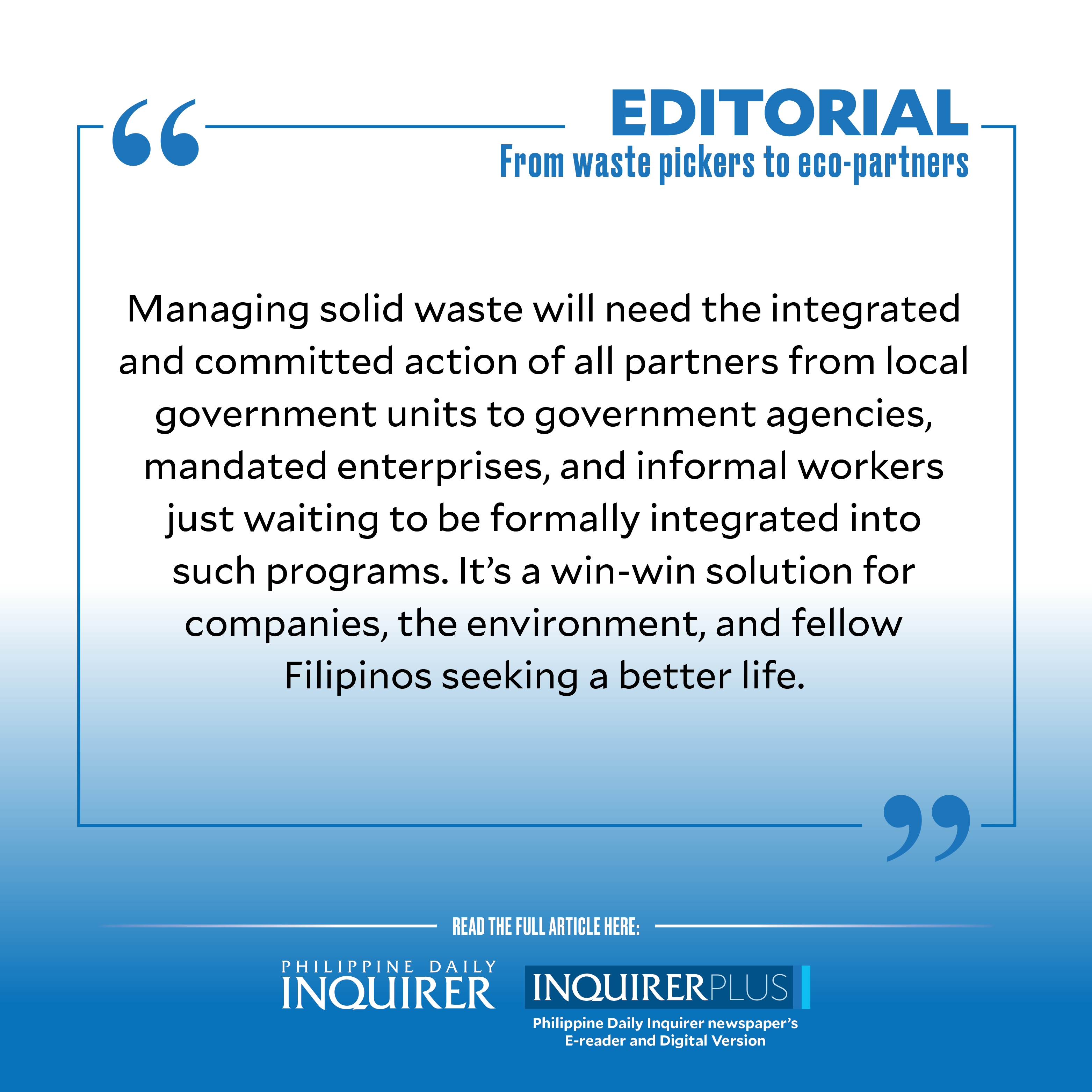From waste pickers to eco-partners

Environment Secretary Maria Antonia Yulo-Loyzaga this week challenged large manufacturers and distributors of plastic-packaged products to help improve the livelihood and working conditions of waste pickers. Why not make them an integral part of your solid waste management, she asked the companies mandated by law to be responsible for the proper disposal of the plastic packaging waste of their products.
“I call on our partners to include in their programs the improvement of livelihood of waste pickers in their communities through the development of alternative opportunities for livelihood, and [their] incorporation into the evolving formal solid waste management industry,” Yulo-Loyzaga said, adding that enterprises can also provide financial literacy programs and training to help build these waste pickers’ entrepreneurship skills. After all, waste pickers can play a vital role in the success of the extended producer responsibility (EPR) programs of “obliged enterprises” with assets worth at least P100 million, under the EPR Act of 2022.
The EPR Act requires these companies to allocate resources to support the collection, recovery, transport, processing, recycling, and disposal of plastic packaging waste after their actual products have been consumed. Under the law, enterprises are required to recover an initial 20 percent of their plastic product footprint, increasing this to 40 percent by 2024, and 80 percent by 2028.
Waste pickers who are already diverting product waste from the environment have unfortunately been largely invisible, underappreciated, and marginalized, thus kept firmly in the crushing grip of poverty, Yulo-Loyzaga noted. Garbage pickers and scavengers remain “locked out” of the value chain of solid waste management, even if they are a “critical and essential” part of the supply chain as the “backbone of the currently limited collection services and … recycling” in the country, she added.
In a 2021 discussion paper on solid waste management practices in the Philippines, the government think tank Philippine Institute for Development Studies (PIDS) pointed out that scavengers or waste pickers had been instrumental in bridging the gap “across material collection, segregation, and recycling,” and that junk shops that take in their finds act as pseudo materials recovery facilities, thus ensuring that solid wastes are kept out of dumps and vital waterways. Citing 2008 data from the Japan International Cooperation Agency, the PIDS said that each disposal site scavenger collected an average of 14.36 kilograms a day of paper waste in Metro Manila, Metro Cebu, and Southern Mindanao, 16.6 kg/day of plastic, and 19.97 kg/day of glass. These informal workers each collected 1.45 kg/day of aluminum waste and 12.28 kg/day of other metal wastes.
Enterprises for one can bring together the waste pickers and tap them as formal partners in segregation and recycling activities, thus helping them become self-employed individuals who can make money from collecting plastic packaging wastes. These include sachets, labels, laminates, and flexible plastic used for shampoos and instant noodles; rigid plastic used in beverage bottles, cutlery, plates, and straws; single-use plastic bags, and polystyrene used for takeout food.
These informal workers who come mostly from urban poor communities can also be integrated as business partners, Yulo-Loyzaga suggested, through the formation of cooperatives and the operation of local collection centers. By recognizing them as formal workers entitled to benefits and safe working conditions, they stand a better chance of getting out of poverty as they are assured a steady job from managing solid waste. As PIDS emphasized in its study, these waste pickers need all the help they can get. “While invisible in official demographics and statistics, scavenging is a common livelihood for the urban poor in low- and middle-income countries. They are usually women, children, elderly, unemployed, or migrants. They are not covered by any health insurance, but their environment is characterized [by] unsafe conditions,” the study noted.
Yulo-Loyzaga also suggested transforming collection and sorting facilities, including junk shops, into formal establishments that can be registered, supported, and expanded under the large enterprises’ EPR programs, enabling them to grapple with the growing volume of waste. According to Yulo-Loyzaga, the Philippines generates as much as 61,000 metric tons of solid waste every day, which includes 163 million plastic sachet packets, 48 million shopping bags, and 45 million thin-film bags a day, 33 percent of which end up in landfills and dumps, with a troubling 35 percent eventually finding their way to the sea.
Managing solid waste will need the integrated and committed action of all partners from local government units to government agencies, mandated enterprises, and informal workers just waiting to be formally integrated into such programs. It’s a win-win solution for companies, the environment, and fellow Filipinos seeking a better life.




















